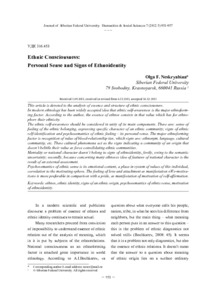Этническое сознание: личностный смысл и знаки этноидентичности
Скачать файл:
URI (для ссылок/цитирований):
https://elib.sfu-kras.ru/handle/2311/2985Автор:
Нескрябина, О.Ф.
Neskryabina, Olga F.
Дата:
2012-07Аннотация:
This article is devoted to the analysis of essence and structure of ethnic consciousness.
In modern ethnology has been widely accepted idea that ethnic self-awareness is the major ethnoforming
factor. According to the author, the essence of ethnos consists in that value which has for ethnophors
their ethnicity.
The ethnic self-awareness should be considered in unity of its main components. These are: sense of
feeling of the ethnic belonging, expressing specific character of an ethnic community; signs of ethnic
self-identification and psychosemantics of ethnic feeling - its personal sense. The major ethnoforming
factor is recognition of value of blood-relationship ties, which signs are: ethnonym, language, cultural
community, etc. These cultural phenomena act as the signs indicating a community of an origin that
doesnt belittle their value as force consolidating ethnic communities.
Mentality or national character doesnt belong to signs of ethnoidentity, firstly, owing to the semantic
uncertainty; secondly, because concerning many ethnoses idea of features of national character is the
result of an external assessment.
Psychosemantics of ethnic sense is its emotional content, a place in system of values of this individual,
correlation to the motivating sphere. The feeling of love and attachment as manifestation «We-motivation
» is more preferable in comparison with a pride, as manifestation of motivation of self-affirmation. Статья посвящена анализу сущности и структуры этнического сознания.
В современной этнологии получила широкое признание идея о том, что этническое самосознание
является основным этнообразующим фактором. По мнению автора, сущность этноса состоит
в том значении, которое имеет для этнофоров их принадлежность к этнической группе.
Этническое самосознание следует рассматривать в единстве его основных компонентов.
Таковыми являются: смысл чувства этнической принадлежности, выражающий специфику
этнической общности; знаки этнической самоидентификации и психосемантика этнического
чувства - ее личностный смысл. Основным этнообразующим фактором является признание
ценности кровнородственной связи, признаками которой являются: этноним, язык, культурная
общность и т.п. Данные культурные феномены выступают в роли знаков, указывающих на
общность происхождения, что не умаляет их значения как силы консолидирующей этнические
общности.
К знакам этноидентичности не относится психический склад, или национальный характер, во-
первых, в силу своей семантической неопределенности; во-вторых, потому, что в отношении
многих этносов представление о чертах национального характера является результатом
внешней оценки.
Психосемантика этнического чувства - это, его эмоциональное наполнение, место в системе
ценностей данного индивида, соотнесенность с мотивирующей сферой. Чувство любви
и привязанности как проявление «Мы-мотивации» является более предпочтительным по
сравнению с чувством гордости, как проявлением мотивации самоутверждения.
Коллекции:
Метаданные:
Показать полную информациюСвязанные материалы
Показаны похожие ресурсы по названию, автору или тематике.
-
Ethnic Tolerance Scale Development: Renovation of Integrated Approach
Breslavs, Gershons; Бреслав, Г. (Сибирский федеральный университет. Siberian Federal University., 2014-04)Many theoretical models have contributed to the field of intergroup relations, but the concept of social tolerance is still very ambiguous despite huge progress in social psychology and related fields in the recent 50 ... -
Theoretical Approaches to the Study of Life Activity of the Ethnic Group
Il’iashevich, Oksana A.; Ильяшевич, О.А. (Сибирский федеральный университет. Siberian Federal University, 2016-06)In this article the author examines the lifeactivity of the ethnic group as a special category in modern culturological and ethnological sciences. The author understands the life activity of such a social community as ... -
Cultural Memory of Migrants of the Krasnoyarsk Territory (Krai) and Ethnic Self-Identification Processes
Avdeeva, Yuliya N.; Авдеева, Ю.Н. (Сибирский федеральный университет. Siberian Federal University, 2018-06)The subject of the present research is cultural memory of migrants in the Krasnoyarsk Territory (Krai). Labour migration in the Krasnoyarsk Territory is a social, economic and cultural process. Migrants constitute a ... -
Ethnic Markets in post-Soviet Transitional Space: Their Role in Society and the Research Area
Diatlov, Victor I.; Дятлов, В.И. (Сибирский федеральный университет. Siberian Federal University, 2016-04)Open-air markets have become an essential element of the post-socialist transitional space. They appear over a vast area from China to Poland and Germany. Coupled with the huge scale and meaningful “shuttle trading”, ... -
Ethnic Culture and Value System of Students (Based on the Material of the Republic of Tuva)
Oorshak, Herel-ool D-N; Oorshak, Svetlana. Ya.; Ооржак, Х. Д-Н.; Ооржак, С.Я. (Сибирский федеральный университет. Siberian Federal University., 2014-03)In pedagogical science many scientists have studied ethnic culture, formation of ethnopedagogical culture and value system of students on the basis of philosophical, axiological and cultural foundations of pedagogy. The ...

